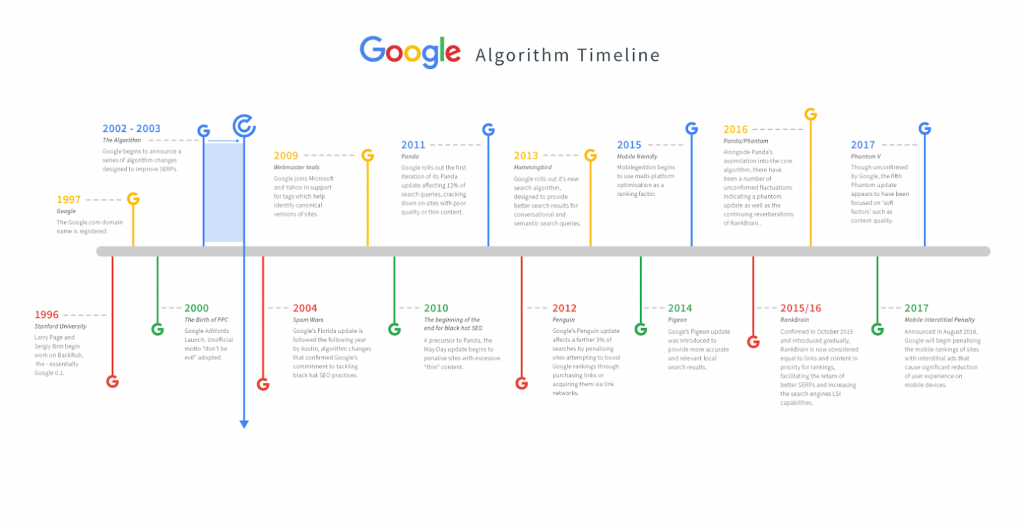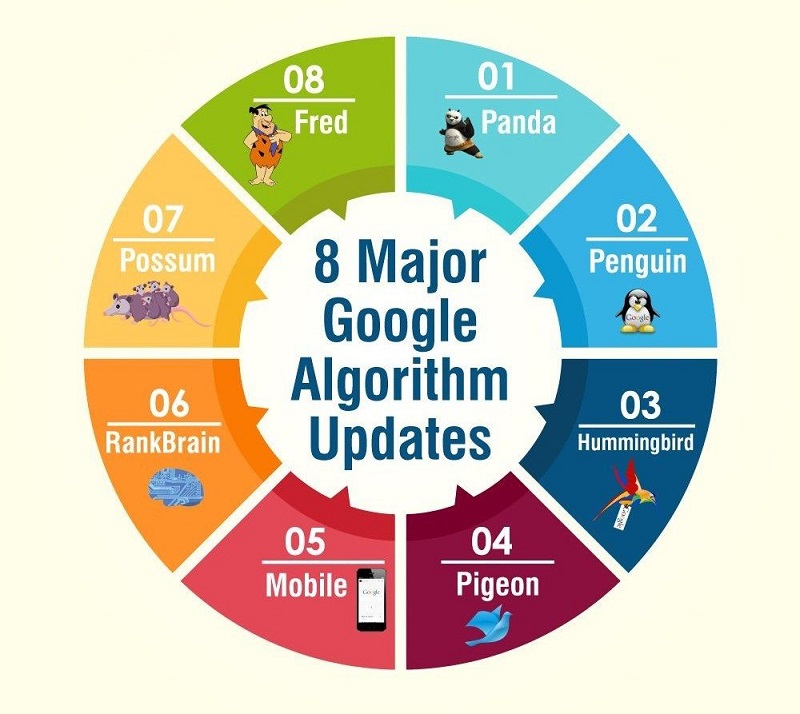Comprehending the Effects of Google's Algorithm Updates on SEO Techniques and Rankings
In the ever-evolving landscape of search engine optimization (SEO), the implications of Google's algorithm updates have actually come to be a centerpiece for services and marketing professionals aiming to preserve or enhance their online visibility (Google’s Algorithm Updates). As Google proceeds to improve its formulas to offer individuals with the most relevant and high-quality search engine result, comprehending exactly how these updates impact search engine optimization methods and rankings is vital. From the subtle shifts in keyword strategies to the extra obvious emphasis on user experience, the interaction in between algorithm updates and search engine optimization methods unveils an intricate web of factors to consider that demand constant alertness and versatility
Evolution of Google's Formula

The Panda update, released in 2011, targeted low-quality web content and penalized internet sites with duplicate, slim, or unimportant web content. Penguin, released a year later on, dealt with web link spam by decreasing the value of manipulative web links. Hummingbird, introduced in 2013, noted a shift in the direction of semantic search, understanding the context and intent behind customer queries instead of just matching key words.
These updates required internet site owners and SEO specialists to focus on user experience, high quality web content, and all-natural link building methods to boost their rankings in Google's search results page. The development of Google's formula emphasizes the search engine's dedication to providing appropriate and beneficial material to customers while penalizing strategies aimed exclusively at pc gaming the system.
Effect On Keyword Phrase Method
With the development of Google's formula in the direction of focusing on individual experience and material significance, the Effect on Search phrase Approach has actually come to be significantly crucial for website owners and search engine optimization specialists looking for to line up with these online search engine updates. Key phrases are no much longer practically matching search terms but understanding user intent and supplying beneficial web content. Google's updates, such as BERT and RankBrain, emphasis on natural language processing and context, making keyword approach extra innovative.

Moreover, with Google's emphasis on semantic search and user-focused material, search phrase stuffing is no longer efficient and can also damage positions. Rather, incorporating key words naturally into top notch, pertinent content is crucial. By recognizing the impact of Google's algorithm updates on keyword phrase method, internet site proprietors can boost their SEO initiatives and boost their visibility in search results.
Modifications in Web Content Optimization
As the landscape of seo remains to evolve, website owners and SEO experts are seeing considerable shifts blog in content optimization approaches. Following Google's formula updates, there has been a growing focus on developing top notch, appropriate, and authoritative material that offers value to customers. This indicates that just stuffing keywords right into posts is no more effective; rather, material should be well-written, engaging, and customized to satisfy the needs of the target market.
Furthermore, there is a higher emphasis on user experience and complete satisfaction, with search engines fulfilling websites that offer a seamless surfing experience and important info. As a result, material optimization now includes not only incorporating pertinent search phrases normally however likewise structuring web content in a way that is easy to browse and review.
Relevance of User Experience
Enhancing find more info user experience on a site is vital in contemporary search engine optimization techniques, working as a crucial factor in identifying a site's exposure and success in online search engine rankings. Individual experience encompasses various elements such as site speed, mobile-friendliness, user-friendly navigation, and engaging content (Google’s Algorithm Updates). Google's algorithms increasingly focus on internet sites that supply a smooth and gratifying user experience, as it directly associates with individual fulfillment and retention
A favorable individual experience not only improves a site's search engine optimization efficiency however likewise adds to higher conversion prices and client loyalty. Websites that are very easy to browse, visually appealing, and offer valuable web content are most likely to attract and keep visitors. On the other hand, websites with poor customer experience metrics might experience high bounce rates and low dwell times, signaling to look engines that the material may not be engaging or relevant for customers.
Consequently, purchasing enhancing individual experience is vital for maintaining an one-upmanship in the ever-evolving digital landscape. By focusing on user-centric design and performance, websites can boost their search engine rankings and ultimately drive even more organic traffic and conversions.
Methods for Future Adaptation
Progressing in the quickly developing landscape of SEO, it is vital for services to embrace ingenious strategies for future adjustment. One vital approach is to concentrate on developing high-grade, relevant content that offers value to customers. This material must be optimized for keywords that straighten with individual intent and ought to be routinely updated to remain present and competitive.
In addition, businesses must prioritize mobile optimization to satisfy the boosting number of customers accessing the web using mobile phones. Guaranteeing that websites tons promptly, are easy to navigate, and give a seamless customer experience on smart phones can help enhance search positions and user contentment.
In addition, leveraging information analytics and customer actions understandings can aid organizations recognize their target market far better and customize their search engine optimization methods appropriately. By monitoring key performance indications and readjusting Source methods based upon data-driven understandings, services can stay ahead of the curve and adapt to the ever-changing search engine optimization landscape. Welcoming arising innovations, such as voice search optimization and man-made knowledge, can additionally be beneficial for future-proofing search engine optimization methods.
Final Thought

With the evolution of Google's algorithm towards focusing on customer experience and web content importance, the Effect on Search phrase Approach has actually ended up being progressively important for site owners and SEO specialists looking for to line up with these search engine updates. Google’s Algorithm Updates. Keyword phrases are no longer simply concerning matching search terms however comprehending user intent and supplying useful material. Google's algorithms significantly focus on sites that offer a smooth and gratifying customer experience, as it directly associates with individual complete satisfaction and retention
In comparison, web sites with bad user experience metrics might suffer from high bounce prices and low dwell times, signifying to browse engines that the content might not be interesting or appropriate for users.
The development of the algorithm has actually shifted emphasis towards customer experience and quality web content, affecting keyword strategy and material optimization.